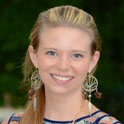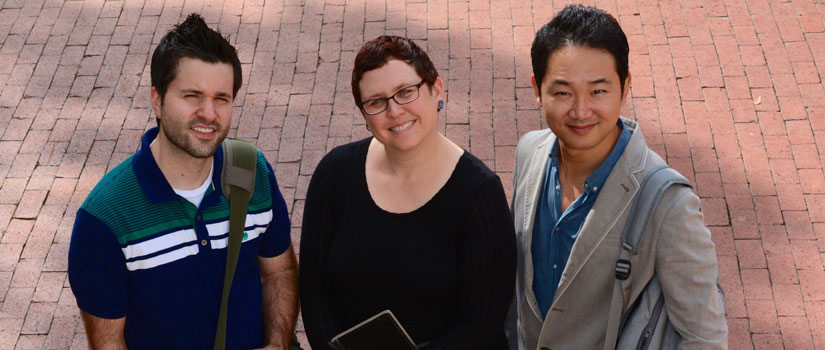Posted Sept. 17, 2014
By Haley Hinze, first year M.M.C. student
Why did our three new faculty members choose teaching? Because they believe in lifelong
learning, and know that they can learn from their students.
What do a library book, a lawnmower, and a social media site have in common? For the
most part, nothing. But they are things that our college's three new faculty members
discuss in their teachings.
Heather Moorefield-Lang, formerly a university librarian, has training in theater
performance and travels whenever she can. Darin Freeburg enjoys gardening now that he has traded his Midwestern life for the warmer Southeast.
And Mo Jang is on a continuous search for authentic international restaurants in the
area.
They are living their new lives in Columbia differently, but their reasons for making
the transition are all similar: to teach students and to learn a few things themselves.
Dr. Heather Moorefield-Lang, School of Library and Information Science
Moorefield-Lang's office door is adorned with pictures and book quotes, and her tablet
sits by the computer disguised as an old hardcopy book. "I actually left it on a restaurant
table once, but nobody messed with it, because, who wants an old book?"
She has been working in libraries since elementary school and, throughout her higher
education, dedicated her research to emerging technology in that field. The programs
she currently enjoys working with allow for creativity, art and critical thinking
for both children and adults in designated spaces in libraries.
Moorefield-Lang's theater background is evident in her classes."I looked at being
a performer and I looked at being a teacher," she says. "It's really exciting. Because
of my performance background, I really like working in that capacity. It's that interaction
with other people that I work with" that sets the classroom apart from the stage for
her.
The constant communication with her students and peers drives her teaching. She believes
in learning not just by watching, but also by doing. She pays attention to how she
learns herself, and turns that into her instruction style. Having learned how to teach
hands-on, audio, visual and other types of ways to learn, she alternates to keep her
students on their toes. "We're trained in all different ways to teach students kindergarten
through 12, so I ask myself why should that be different in college?"
Dr. Darin Freeburg, School of Library and Information Science
"Having a Ph.D. does not make you more intelligent," says Freeburg. To him, the degree
simply indicates the career path he's devoted to. He believes in breaking down barriers
between student and instructor. "I'm not just sitting in an ivory tower looking down
upon them." Teaching "makes me feel like I'm contributing to society in some way,"
he says.
Freeburg also likes to bring his real-world experiences to the classroom. His interests
in yard work, religion and music have not only helped him in his education, but in
bringing in new perspectives in his Intro to Information Literacy and Technology and
Online Information Services classes. He even "did a bunch of research on a lawnmower"
and brings that up in his lectures.
He says that sharing anecdotes between teacher and student can lead to more learning
and applications. Students have their own experiences that they can teach to their
professors, and they "have a lot to say."
Dr. S. Mo Jang, School of Journalism and Mass Communications
What is "big data"? Not many people know, according to Jang, but his students are
about to. "This field is pretty excited about the new big data research opportunities,
but not many people are actually using big data for research," he says. Big data are
large file sets that must be broken down into subjects for easier access, "meaning
any social topics could be there."
Collaboration drives Jang's teaching. " I don't think I'm just delivering information
and knowledge." He has his students work in pairs or small groups to allow more open
and honest discussion, especially in a larger environment. He encourages questions
and incorporates trendy topics to keep scholars engaged. In his Persuasion Theory
class, for example, he uses hot-button themes like college hook-up culture to help
students apply theories to real-world scenarios.
In addition, Jang thinks he can use his research to collaborate with his students
and peers. "I have big data access for Twitter, big data access in blogs. Already
many people have contacted me for projects," he says. He says he can provide a broader
research spectrum in the field of mass media and is excited to introduce it to the
school of journalism and mass communications. "Any researcher can work with me."
Why do the new faculty members focus on a constant cycle between teaching and learning
with their students? Why do they inject stories about gardening, traveling, reading
and socializing? Because real-life application matters. Because why matters.

Haley Hinze
Haley Hinze is a first-year Master of Mass Communication student from Greenville,
S.C. With interests in both written and visual communications, she aspires to enter
the magazine publishing industry. When she's not in school, you can find her traveling
almost anywhere in the country.

